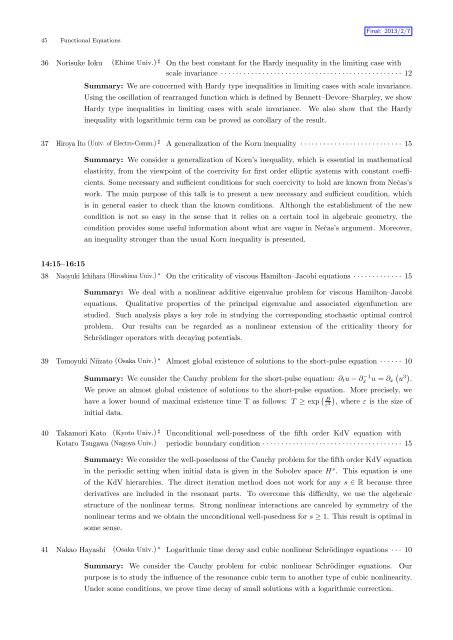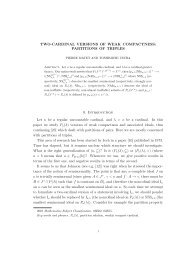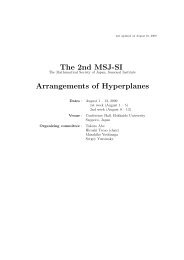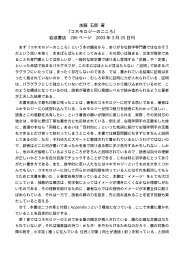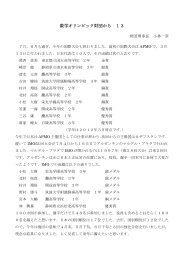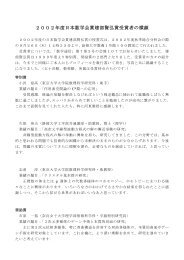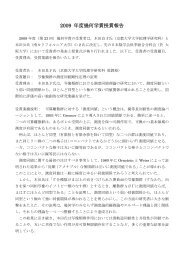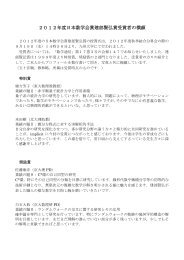Titles and Short Summaries of the Talks
Titles and Short Summaries of the Talks
Titles and Short Summaries of the Talks
You also want an ePaper? Increase the reach of your titles
YUMPU automatically turns print PDFs into web optimized ePapers that Google loves.
45 Functional Equations<br />
Final: 2013/2/7<br />
36 Norisuke Ioku (Ehime Univ.) ♯ On <strong>the</strong> best constant for <strong>the</strong> Hardy inequality in <strong>the</strong> limiting case with<br />
scale invariance · · · · · · · · · · · · · · · · · · · · · · · · · · · · · · · · · · · · · · · · · · · · · · · · 12<br />
Summary: We are concerned with Hardy type inequalities in limiting cases with scale invariance.<br />
Using <strong>the</strong> oscillation <strong>of</strong> rearranged function which is defined by Bennett–Devore–Sharpley, we show<br />
Hardy type inequalities in limiting cases with scale invariance. We also show that <strong>the</strong> Hardy<br />
inequality with logarithmic term can be proved as corollary <strong>of</strong> <strong>the</strong> result.<br />
37 Hiroya Ito (Univ. <strong>of</strong> Electro-Comm.) ♯ A generalization <strong>of</strong> <strong>the</strong> Korn inequality · · · · · · · · · · · · · · · · · · · · · · · · · · · 15<br />
14:15–16:15<br />
Summary: We consider a generalization <strong>of</strong> Korn’s inequality, which is essential in ma<strong>the</strong>matical<br />
elasticity, from <strong>the</strong> viewpoint <strong>of</strong> <strong>the</strong> coercivity for first order elliptic systems with constant coeffi-<br />
cients. Some necessary <strong>and</strong> sufficient conditions for such coercivity to hold are known from Nečas’s<br />
work. The main purpose <strong>of</strong> this talk is to present a new necessary <strong>and</strong> sufficient condition, which<br />
is in general easier to check than <strong>the</strong> known conditions. Although <strong>the</strong> establishment <strong>of</strong> <strong>the</strong> new<br />
condition is not so easy in <strong>the</strong> sense that it relies on a certain tool in algebraic geometry, <strong>the</strong><br />
condition provides some useful information about what are vague in Nečas’s argument. Moreover,<br />
an inequality stronger than <strong>the</strong> usual Korn inequality is presented.<br />
38 Naoyuki Ichihara (Hiroshima Univ.) ∗ On <strong>the</strong> criticality <strong>of</strong> viscous Hamilton–Jacobi equations · · · · · · · · · · · · · 15<br />
Summary: We deal with a nonlinear additive eigenvalue problem for viscous Hamilton–Jacobi<br />
equations. Qualitative properties <strong>of</strong> <strong>the</strong> principal eigenvalue <strong>and</strong> associated eigenfunction are<br />
studied. Such analysis plays a key role in studying <strong>the</strong> corresponding stochastic optimal control<br />
problem. Our results can be regarded as a nonlinear extension <strong>of</strong> <strong>the</strong> criticality <strong>the</strong>ory for<br />
Schrödinger operators with decaying potentials.<br />
39 Tomoyuki Niizato (Osaka Univ.) ∗ Almost global existence <strong>of</strong> solutions to <strong>the</strong> short-pulse equation · · · · · · 10<br />
Summary: We consider <strong>the</strong> Cauchy problem for <strong>the</strong> short-pulse equation: ∂tu − ∂−1 (<br />
3<br />
x u = ∂x u ) .<br />
We prove an almost global existence <strong>of</strong> solutions to <strong>the</strong> short-pulse equation. More precisely, we<br />
have a lower bound <strong>of</strong> maximal existence time T as follows: T ≥ exp ( B<br />
ε2 initial data.<br />
) , where ε is <strong>the</strong> size <strong>of</strong><br />
40 Takamori Kato (Kyoto Univ.) ♯ Unconditional well-posedness <strong>of</strong> <strong>the</strong> fifth order KdV equation with<br />
Kotaro Tsugawa (Nagoya Univ.) periodic boundary condition · · · · · · · · · · · · · · · · · · · · · · · · · · · · · · · · · · · · · 15<br />
Summary: We consider <strong>the</strong> well-posedness <strong>of</strong> <strong>the</strong> Cauchy problem for <strong>the</strong> fifth order KdV equation<br />
in <strong>the</strong> periodic setting when initial data is given in <strong>the</strong> Sobolev space H s . This equation is one<br />
<strong>of</strong> <strong>the</strong> KdV hierarchies. The direct iteration method does not work for any s ∈ R because three<br />
derivatives are included in <strong>the</strong> resonant parts. To overcome this difficulty, we use <strong>the</strong> algebraic<br />
structure <strong>of</strong> <strong>the</strong> nonlinear terms. Strong nonlinear interactions are canceled by symmetry <strong>of</strong> <strong>the</strong><br />
nonlinear terms <strong>and</strong> we obtain <strong>the</strong> unconditional well-posedness for s ≥ 1. This result is optimal in<br />
some sense.<br />
41 Nakao Hayashi (Osaka Univ.) ∗ Logarithmic time decay <strong>and</strong> cubic nonlinear Schrödinger equations · · · 10<br />
Summary: We consider <strong>the</strong> Cauchy problem for cubic nonlinear Schrödinger equations. Our<br />
purpose is to study <strong>the</strong> influence <strong>of</strong> <strong>the</strong> resonance cubic term to ano<strong>the</strong>r type <strong>of</strong> cubic nonlinearity.<br />
Under some conditions, we prove time decay <strong>of</strong> small solutions with a logarithmic correction.


